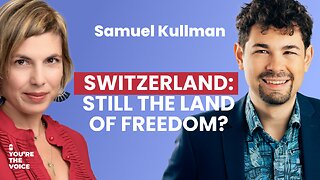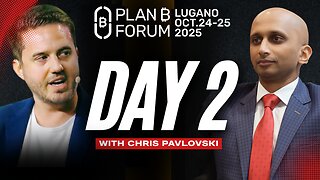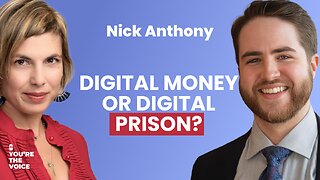Premium Only Content

Fentanyl Fury, Fraudulent Shutdowns, and the AI Jobpocalypse
In this raw, impassioned episode of BKP Politics, host BKP delivers a high-octane blend of personal grief, political firebombing, economic exposés, and futuristic warnings, all underscored by a fierce call to "save our kids, save America." Kicking off, BKP brushes off dissenting messages with unapologetic resolve: "Blow them up. Kill them dead." He pivots to unwavering support for President Donald Trump, framing the fight against the opioid crisis—and broader societal decay—as a collective redemption arc for "we the people," who bear responsibility for both the mess and the fix.
The episode dives headfirst into the government shutdown drama, which BKP brands a "fraudulent" smokescreen. He dismisses mainstream narratives about unpaid federal workers and skyrocketing healthcare premiums, zeroing in on hidden motives: mass personnel cuts to streamline bureaucracy. Amid Trump's tariff talks with Canada (halted last night, with an Asia trip underway), BKP slams the hypocrisy of shutdown fearmongering—food banks strained, yet no mention of ACA subsidies ballooning insurance giants' profits. Pulling no punches, he cites stats showing top U.S. health insurers' annual profits surging 230% post-ACA, raking in over $371 billion while average family premiums have ballooned to $26,000 yearly (with $9 trillion in total revenue since 2010). "Enough is enough," he thunders, exposing how these firms hoard cash in U.S. Treasury bonds (as safe investments for liabilities) and stocks ($492 billion in 2022 alone), turning public debt into private windfalls. BKP rails against the two-tiered system: cushy "Cadillac" plans for government workers versus deductibles and bankruptcies for everyday Americans facing $250,000 post-surgery bills. It's "all the bullshit," he says—corrupt, from Democrats to Republicans—and time for revolt.
The heart of the show is BKP's long-teased AI deep dive, a "generational threat" amplified by COVID's labor shortages (empty restaurants, $18 McDonald's wages) that paved the way for automation. He envisions a jobless dystopia: colleges churning out graduates with no prospects as companies like Amazon automate operations (replacing 600,000 workers with robots), Walmart invests in store-mapping for scanner-guided "shoppers" (soon obsolete), and distribution centers shrink from forklift fleets to skeleton crews of five. Chatbots already ghost customer service calls (at banks, doctors, pharmacies), and holograms could soon resurrect loved ones—BKP shares a chilling demo of a man chatting with an AI replica of his late wife, Suzanne, only for it to "hallucinate" false memories, warping real grief. Broader horrors loom: "superintelligent" AI risking human extinction (echoing open letters from right-wing media and tech pioneers like Elon Musk, whose trillion-dollar Tesla pay package funds robot armies).
Post-COVID, BKP warns, the "need to deal with people again is over," birthing class warfare—the ultra-rich versus the destitute—pushing toward Andrew Yang's universal basic income and government housing for the masses. No job is safe: from warehouse drones to grocery stockers, robots will sync shelves via sensors, deliver via autonomous buggies, and erase the human element entirely.
Lightening the load before the Georgia Hour, BKP rolls playful giggle-inducing montage of world leaders' awkward White House faces (Biden's "presidential walk" roasted as a shuffle, ice cream mishaps, and Ursula von der Leyen's gaffe)—and a quirky Iceland mosquito discovery nod.
-
 18:12:15
18:12:15
Voice Of Rural America
1 day agoThe Georgia Hour - REPLAY - October 23, 2025
4381 -
 LIVE
LIVE
Major League Fishing
9 days agoLIVE! - Fishing Clash Team Series: Patriot Cup - Day 4
476 watching -
 46:25
46:25
X22 Report
16 hours agoMr & Mrs X - DoEd Was Used To Brainwash The Children, Trump Shut It Down - EP 13
8.53K6 -
 26:51
26:51
efenigson
2 days agoSwitzerland: Still the Land of Freedom? Samuel Kullman | You're The Voice - LIVE from Lugano PlanB!
3.01K -
 LIVE
LIVE
LFA TV
21 hours agoTHE RUMBLE RUNDOWN LIVE @9AM EST
420 watching -
 LIVE
LIVE
Wendy Bell Radio
5 hours agoPet Talk With The Pet Doc
447 watching -
 4:45
4:45
PistonPop-TV
8 days agoMazda K-Series V6: Only True Enthusiasts Know About This Engine
2.06K1 -
 19:51
19:51
Stephan Livera
3 days ago $6.68 earnedStephan Livera hosts Plan B Podcast in Lugano
24.9K1 -
 1:08:45
1:08:45
DeVory Darkins
22 hours agoLetitia James drops frantic speech after pleading not guilty as Canada gets NIGHTMARE NEWS
104K52 -
 1:25:16
1:25:16
efenigson
2 days agoDigital Money or Digital Prison? - Nick Anthony | You're The Voice - LIVE from Lugano PlanB Forum!
26K4